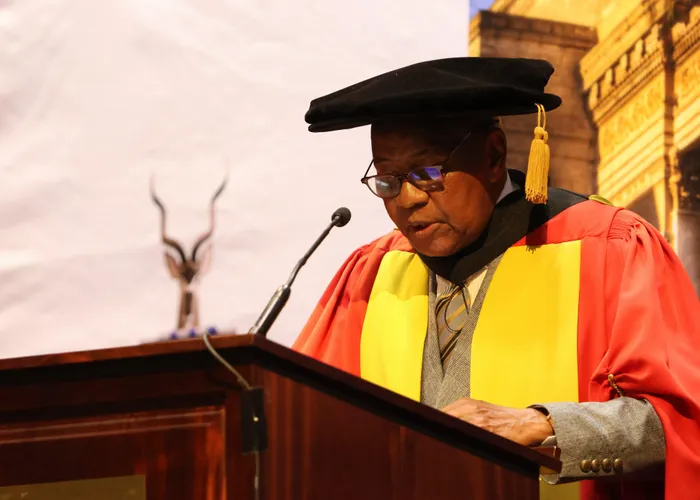#LetsFixSAFootball | Kaizer Chiefs boss Motaung warns: No room in the PSL for 'Tata ma chance, tata ma millions'
Premier Soccer League

KAIZER chiefs owner Kaizer Motaung Snr. speaking at Wits University has suggested the PSL become more stringent with issuing of PSL statuses. | KaizerChiefs
Image: @KaizerChiefs
KAIZER Motaung, the revered founder of Kaizer Chiefs FC, has urged the Premier Soccer League (PSL) to implement stringent regulations surrounding the buying and selling of club statuses.
As the architect of one of Africa's most iconic football clubs, Motaung’s insights carry weight, especially in an era where financial instability has led to the untimely demise of several teams within the league.
In a bold statement that resonates with both the challenges and potential of South African football, Motaung said in an interview with City Press newspaper that the volatility of club status transactions is detrimental to the integrity and sustainability of the game.
“The problem in our football might be a question of this thing of changing ownership… becoming a problem.”

#LetsFixSAFootball
Image: Independent Media
This directly references the fate of clubs like Wits, which faced financial hardships that eventually led to their sale and subsequent disappearance from the league structure.
“Maybe Wits would not have been sold had they not had financial challenges,” Motaung said, stressing the need for clubs to be financially viable before ownership changes hands.
Drawing from his extensive experience, Motaung indicated that the PSL must create a framework that prevents individuals with sudden wealth from making impulsive decisions that could destabilise the league.
“We probably have to bring stringent rules that make it difficult for people just to come in, just because they have acquired some money somewhere (like winning the Lotto), then they buy a club status,” he urged.
Such measures could protect the identity and legacy of longstanding clubs that have played pivotal roles in South African football history.
As Motaung expressed, the ideal regulations would discourage opportunistic buyers and establish a more robust and sustainable football landscape.
He suggested a need for systemic changes that ensure any owner who wishes to enter the league possesses both the financial acumen and a lasting commitment to uphold the sport's traditions.
“Football has to come up with something that will make it stronger and stable so that we don’t have these loopholes where any Tom, Dick and Harry... buys a club status and then comes into the league,” he explained.
Interestingly, Motaung’s connection to the game runs deep, with his son, Kaizer Junior, having progressed through the ranks of the Wits Academy before embarking on a career abroad.
This family legacy underscores the importance of nurturing talent and loyalty within football, contrasting sharply with the fate of clubs that vanish after being hastily bought.
As Motaung poignantly concluded, maintaining the dual challenges of performance on the pitch while ensuring sound business practices is imperative for the future of South African football.
“It should be difficult, not only on the field but also off the field on the business side of things,” he remarked.
His call to action stands not just as a plea for reform but as a vision for a healthier, more stable footballing environment where clubs can thrive and honour their legacies.
Related Topics: